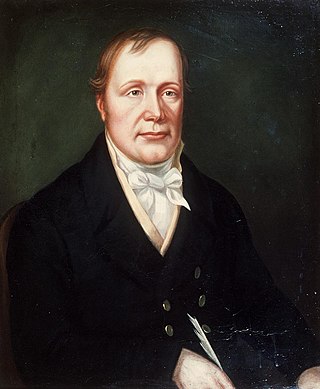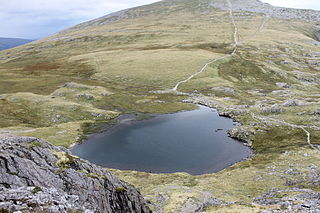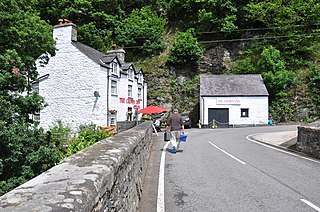Rhun ap Maelgwn Gwynedd, also known as Rhun Hir ap Maelgwn Gwynedd, sometimes spelt as 'Rhûn', was King of Gwynedd. He came to the throne on the death of his father, King Maelgwn Gwynedd. There are no historical records of his reign in this early age. A story preserved in both the Venedotian Code and an elegy by Taliesin says that he waged a war against Rhydderch Hael of Alt Clut and the kings of Gododdin or Manaw Gododdin. The small scattered settlement of Caerhun in the Conwy valley is said to be named for him, though without strong authority. Rhun also appears in several medieval literary stories, as well as in the Welsh Triads. His wife was Perwyr ferch Rhûn "Ryfeddfawr" and their son was Beli ap Rhun "Hîr".

Owen Jones, known by his bardic name of Owain Myfyr, was a Welsh antiquarian.

The Honourable Society of Cymmrodorion, often called simply the Cymmrodorion, is a London-based Welsh learned society, with membership open to all. It was first established in 1751 as a social, cultural, literary and philanthropic institution. It fell into abeyance between 1787 and 1820, and again between 1843 and 1873. In its second and third incarnations its interests have been predominantly cultural and antiquarian. The present society claims continuity from that founded in 1751, although the three successive societies have in fact been slightly different in character and aims.

John Jones, better known by his bardic name Jac Glan-y-gors, was a Welsh language satirical poet and radical pamphleteer, born in Cerrigydrudion, Denbighshire, north Wales.
Richard Morris was a Welsh writer and editor, a younger brother of Lewis Morris.
This article is about the particular significance of the year 1818 to Wales and its people.
This article is about the particular significance of the year 1771 to Wales and its people.

St David's School was an independent girls' school in Ashford, England. The school was originally established in London in 1716 as the British Charity School or Welsh Charity School. It was located in a purpose-built home on Clerkenwell Green from 1738, before moving to Gray's Inn Road in 1772, and eventually to Ashford in 1857. It was at first a boys' school, and then from 1758 co-educational, but from 1882 it began to admit girls only and became known as the Welsh Girls' School. It changed its name to St David's School in 1967, and closed in 2009.

The Cambrian Archaeological Association was founded in 1846 to examine, preserve and illustrate the ancient monuments and remains of the history, language, manners, customs, arts and industries of Wales and the Welsh Marches and to educate the public in such matters. The association's activities include sponsoring lectures, field visits, and study tours; as well as publishing its journal, Archaeologia Cambrensis, and monographs. It also provides grants to support research and publications.
Robert Thomas Jenkins CBE was a Welsh historian and academic.
Y Cymmrodor was the annual journal of the Honourable Society of Cymmrodorion, published between 1821 and 1951. It contained essays and lectures on historical and literary topics and Welsh poetry.
The Dictionary of Welsh Biography (DWB) is a biographical dictionary of Welsh people who have made a significant contribution to Welsh life over seventeen centuries. It was first published in 1959, and is now maintained as a free online resource.
John Edwards was a Welsh poet, born at Crogen Wladys in Glyn Ceiriog. He co-founded a London Welsh literary and cultural society.
The Gwyneddigion Society was a London-based Welsh literary and cultural society. The original society was founded in 1770 and wound up in 1843. It was briefly revived in 1978. Its proceedings were conducted through the medium of Welsh.
Cymdeithas Cymreigyddion y Fenni, which translates as the Abergavenny Welsh Society, is a Welsh language society in Abergavenny.

The Campaign for the Protection of Rural Wales (CPRW) (Welsh: Ymgyrch Diogelu Cymru Wledig (YDCW)), originally named the Council for the Preservation of Rural Wales, is a charity in Wales that aims to secure the protection and enhancement of the country's landscapes and environment.
The Honourable and Loyal Society of Antient Britons was a London-based Welsh social, cultural, and philanthropic society, which was in existence from 1715 until the end of the 18th century.
Edward Jones, nicknamed "Ginshop" Jones, was a Welsh Calvinistic Methodist "exhorter" and lay preacher in London, who ended his life in disgrace.

Llanfihangel Glyn Myfyr is a village and community in Conwy County Borough, in Wales. It is located within the historic county of Denbighshire on the Afon Alwen, at the south western edge of the Clocaenog Forest, 9.1 miles (14.6 km) north west of Corwen, 2.5 miles (4.0 km) east of Cerrigydrudion and 27.5 miles (44.3 km) south of Conwy. At the 2001 census the community had a population of 195, reducing to 189 at the 2011 census.
This article is about the particular significance of the year 1715 to Wales and its people.